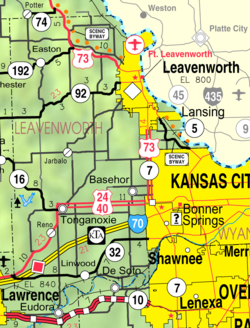Leavenworth (KS)
| Leavenworth, Kansas | ||
|---|---|---|
| City | ||

Downtown Leavenworth (2014)
|
||
|
||
| Motto: First City of Kansas | ||
 Location within Leavenworth County and Kansas |
||
 KDOT map of Leavenworth County (legend) |
||
| Coordinates: 39°18′40″N 94°55′21″W / 39.31111°N 94.92250°WCoordinates: 39°18′40″N 94°55′21″W / 39.31111°N 94.92250°W | ||
| Country | United States | |
| State | Kansas | |
| County | Leavenworth | |
| Founded | 1854 | |
| Incorporated | 1855 | |
| Government | ||
| • Type | Commission-Manager | |
| • Mayor | Nancy Bauder | |
| • Mayor Pro-tem | Mark Preisinger | |
| • City Manager | Paul Kramer | |
| • City Clerk | Carla Williamson | |
| Area | ||
| • Total | 24.06 sq mi (62.32 km2) | |
| • Land | 24.04 sq mi (62.26 km2) | |
| • Water | 0.02 sq mi (0.05 km2) | |
| Elevation | 840 ft (256 m) | |
| Population (2010) | ||
| • Total | 35,251 | |
| • Estimate (2013) | 35,891 | |
| • Density | 1,500/sq mi (570/km2) | |
| Time zone | CST (UTC-6) | |
| • Summer (DST) | CDT (UTC-5) | |
| ZIP codes | 66043, 66048 | |
| Area code | 913 | |
| FIPS code | 20-39000 | |
| GNIS feature ID | 0478411 | |
| Website | LVKS.org | |
Leavenworth is the largest city in and the county seat of Leavenworth County, Kansas, United States. As of the 2010 census, the city population was 35,251. Located on the west bank of the Missouri River 25 mi (40 km) northwest of Kansas City, Missouri, it is part of the Kansas City metropolitan area.
The site of Fort Leavenworth, built in 1827, the city became known in American history for its role as a key supply base in the settlement of the American West. It is important in nineteenth-century African-American history. During the American Civil War, it was the destination of numerous African-American refugee slaves who escaped from Missouri and other slave states.
The city has been notable as the location of several prisons, particularly the United States Disciplinary Barracks and United States Penitentiary, Leavenworth.
Leavenworth, founded in 1854, was the first city incorporated in the territory of Kansas. The city developed south of Fort Leavenworth, which was established as Cantonment Leavenworth in 1827 by Colonel Henry Leavenworth. Its location on the Missouri River made it a destination for refugee African-American slaves seeking freedom from the slave state of Missouri in the antebellum years. Abolition supporters helped them find refuge. In the years before the American Civil War, Leavenworth was a hotbed of anti-slavery and pro-slavery agitation, often leading to open physical confrontations on the street and in public meetings.
...
Wikipedia

